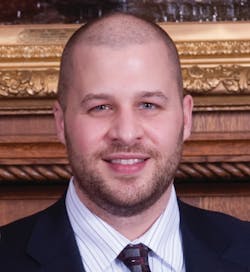Top 40 Under 40: Dr. Travis DeVault
Travis L. DeVault
Project Leader
U.S. Department of Agriculture, National Wildlife Research Center
Date of Birth: 7/16/1974
Years in Aviation: 13
“I’m fascinated with flight,” says Ornithologist Dr. Travis DeVault. This fascination is what drew him to aviation in the first place.
As a research wildlife biologist and project leader at the USDA, Wildlife Services, National Wildlife Research Center’s (NWRC) Ohio Field Station in Sandusky, DeVault oversees a team of research scientists and biologists whose purpose is to conduct research and develop methods to reduce wildlife strikes with aircraft. The research conducted by Dr. DeVault’s team forms the basis for FAA regulations regarding wildlife conflicts with civil aviation. As the only research group of its kind, the NWRC Ohio Field Station is recognized as a world leader in this area.
DeVault earned a Bachelor’s and a Master’s degree in biology from Indiana State University and a PhD (2003) in wildlife ecology from Purdue University. His work in aviation began in 2000 with his dissertation research, during which he studied the flight behavior of vultures for inclusion into computer models of bird avoidance for aircraft.
Since that time his research on wildlife-aircraft collisions has expanded into many areas. A current focus is the potential suitability of land cover alternatives to turf grass at airports from a wildlife perspective, including renewable energy production and agriculture. This promising research area could trigger a paradigm shift in airport land cover from an overreliance on turf grass to more productive and “greener” land covers such as biofuel and solar energy production that reduce wildlife hazards at airports.
DeVault has published more than 75 scientific journal articles and book chapters, and served as lead editor for the book “Wildlife in Airport Environments: Preventing Animal-Aircraft Collisions through Science-Based Management,” published in 2013 by the Johns Hopkins University Press. This book provides the first comprehensive overview of the science underlying wildlife management efforts at airports.
